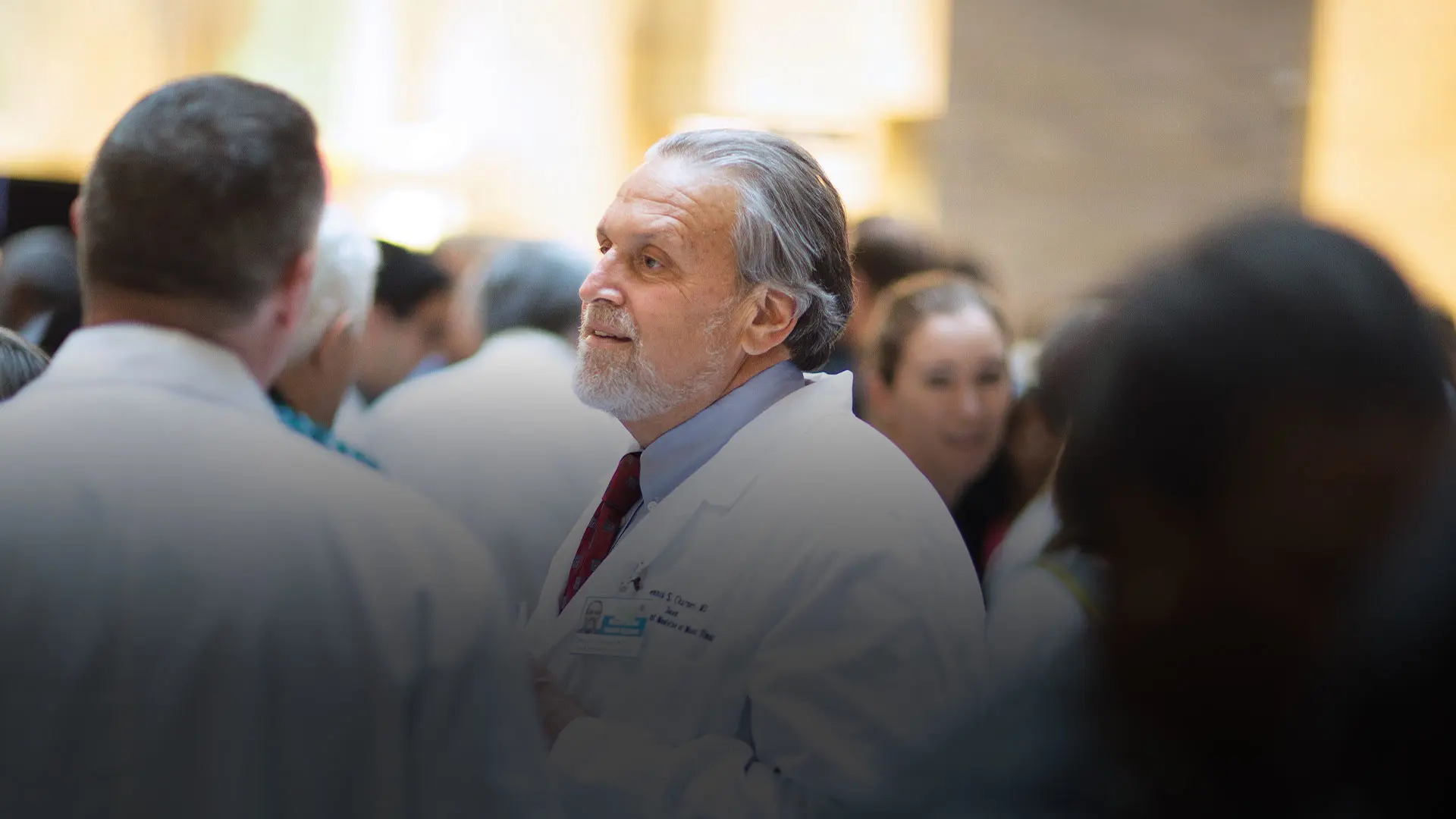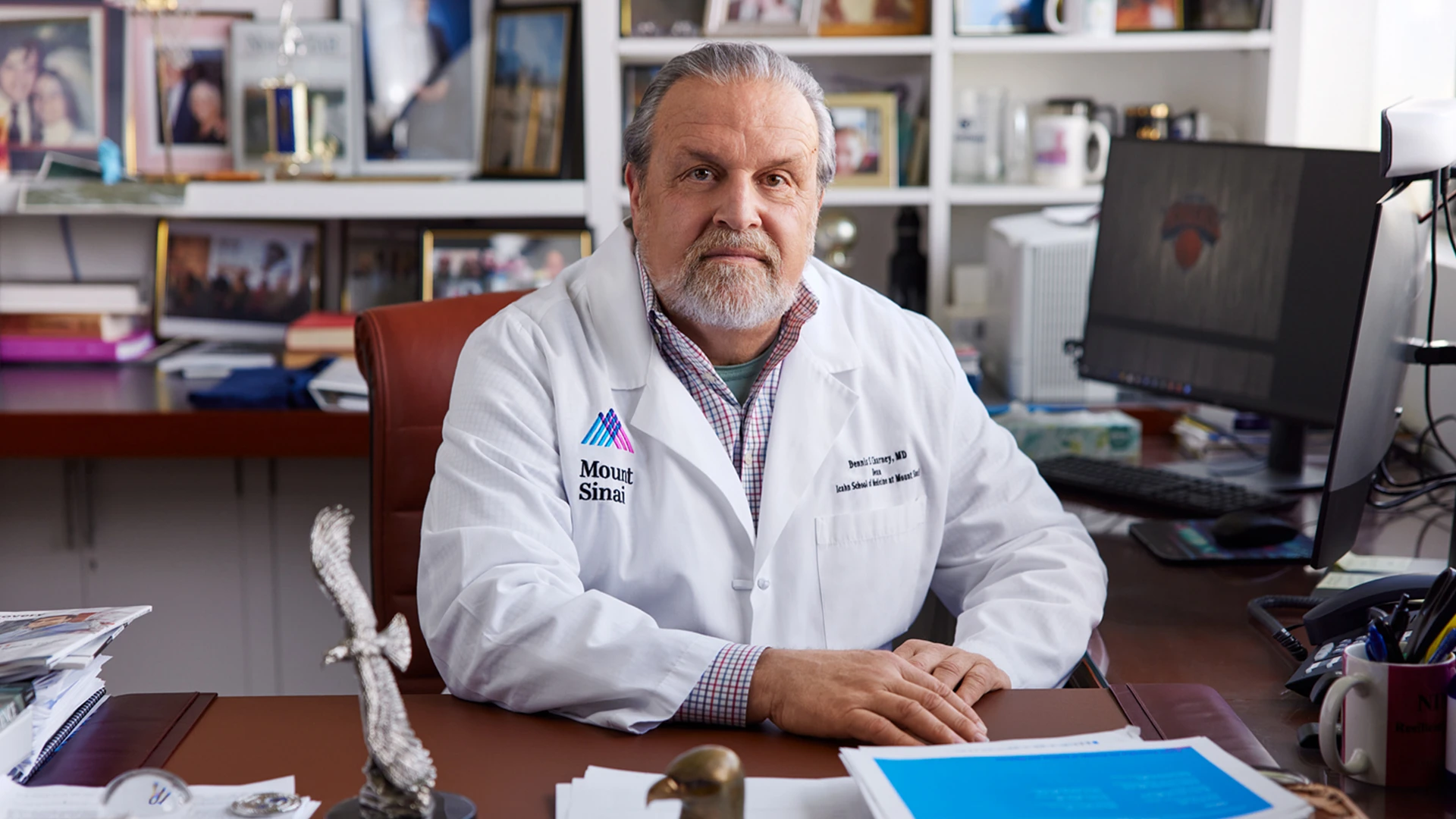In the 18 years he has been at Mount Sinai, Dennis S. Charney, MD, has left an indelible mark on the institution. He announced in May 2025 that he would step down as Dean of the Icahn School of Medicine at Mount Sinai while remaining on the faculty and continuing his research and teaching.
In a conversation shortly before his last day as Dean, Dr. Charney discussed his career, his key accomplishments, his vision for the future of Mount Sinai, and what comes next for him.
How have the steps you've taken as Dean prepared the Icahn School of Medicine for this transition?
One of the criteria for being a good leader is that when you step down, the institution can continue to thrive. I’m very confident that will happen here at Mount Sinai. We have the infrastructure, the faculty, the students, to enable that, and also the leadership that will take my place. Eric Nestler has been named the Interim Dean. He has been a friend and colleague of mine for more than 40 years. He's a fantastic scientist. So, I’m very confident he’s going to carry on what we have accomplished, and not only continue what we’ve done, but also come up with new ideas.
Looking down the road, where do you see the Icahn School of Medicine heading?
I view things in five-year increments. We’ve made enormous investments in genetics, in artificial intelligence. I do think, over the next five years, maybe a little bit longer, genetics and artificial intelligence will make a great impact on health care, and Mount Sinai will be at the leading edge of that. One of the things I expect will happen at Mount Sinai is that we will leverage those investments in AI and genetics, making our ability to take care of patients much more personalized—personalized medicine, better care, more effective care.
You believe in bold science. How do you find researchers who will be bold scientists? What characteristics do you search for?
One of the most important things I did as Dean is recruitment, and I’ve been very involved in the recruitment of junior faculty, as well as senior faculty. One of the things that I look for is: Are they entrepreneurial? Are they satisfied with the current scheme of things, or do they want to push the envelope? Are they willing to take risks? Are they willing to fail and learn from failure? In other words, they’re bold. I look for that in literally every recruitment that we make. I think that’s made a difference. It has changed the culture at Mount Sinai, over the years that I’ve been Dean, where failure is accepted. In fact, if you’re not failing, you’re not trying hard enough. Entrepreneurial, that’s to be expected. Taking risks, accepted. Also, I tell our faculty and our students that as your career progresses, it’s not enough just to publish papers in top journals or to get grants, such as those from the NIH (National Institutes of Health). Your research needs to make a difference. It needs to change the lives of our patients. That’s the ultimate outcome measure. I look for faculty and students who have that as a goal.
So, not merely pushing science forward, but pushing science forward with a vision toward having an impact on patients.
Pushing science forward, yes. But in a way that is not only incremental, where you’re comfortable in terms of your science, in taking things one step at a time, but also in a way where you’re willing to make a leap that is a new way of thinking about things in your area of science, as it relates to biomedical research.
And the Icahn School of Medicine is filled with people who are willing to do that?
Correct. It is. That’s one of the most exciting things about the environment here. And because our faculty is characterized by that, we attract students who want to learn in that environment.
Is there anything else holding us back from achieving more breakthroughs, from advancing science further?
Well, funding is obviously important, but it’s the way funding needs to happen. And when I say funding, it could be from the National Institutes of Health, the Department of Defense. It can come from philanthropy, which gives you a lot of freedom. What can hold you back is being restricted in your thinking, because great findings come from unexpected directions. So, you need to have the freedom to think boldly and not necessarily follow tradition.
As you say, at Mount Sinai there’s bold thinking, with people unafraid to fail. Do we need more of that across science at other institutions?
We do. For example, the way NIH has funded science has been very traditional, and that needs to change. Some of the greatest discoveries in the history of science as it relates to medicine come from very unexpected directions. The one I like to point out is that, traditionally, we thought of ulcers as being caused by stress. One of the great scientific discoveries was made by Barry Marshall. He discovered that many ulcers were caused by bacteria, and that you could treat gastric ulcers with antibiotics. It took decades for the field to believe him, to believe that was the case. Ultimately what he did is he swallowed bacteria, produced ulcers in himself, and treated himself with antibiotics. That research led to the Nobel Prize for him. That’s a great example that you’ve got to think boldly, think out of the box, and fight the skepticism with which your field might view you.
In an interview, Dr. Charney discusses funding for research and the importance of the freedom to think boldly.
So, would you say that the scientific community should be less skeptical, more open to unexpected discoveries?
Absolutely. But also, it’s important that scientists don’t give up when there is skepticism based on your work.
When you look back at your years at the Icahn School of Medicine, what are you most proud of?
I’m very proud of how we’ve changed the culture, how we are entrepreneurial. We attract great scientists who think boldly. Our metrics have changed in terms of how much NIH funding we now attract and the quality of our students. The environment, I’m very proud of that, and the kind of leadership that I’ve attracted in multiple departments and institutes. It’s not a one-note tune here. We’re very broad in what we care about, what we investigate, and how we treat our patients. It’s a very solid platform that we have put together. I’m very confident in the future. And, personally, my own research has flourished while I’ve been Dean.
Though you’re stepping down as Dean of the School, you’re remaining at Mount Sinai. What are your plans?
I’m going to miss being Dean, no doubt. But there are things I can continue in my professional life that I think will be inspiring. In my research, I have discovered two treatments that are now on the market for the treatment of depression: ketamine and a new app that people can utilize to treat depression. I think I may have a third discovery in me that could lead to new treatments for patients with depression. So, I have some ideas I will pursue. I will also continue to write, which I enjoy. And I enjoy mentoring, so I’m going to work with faculty and students in my area of research to help them in their careers.
How do you see the practice of medicine changing in the next few years?
Genetics is going to play a major role. I think sequencing your genome is going to be a routine laboratory test. When you go to the doctor now, you’ll get a series of tests that measure your blood count and your liver function, your kidney function, and things like that. I think that pretty soon, your genome—the genes that you have—will be measured. Sequencing the human genome is going to be routine. It’s not there yet, but I think soon. And it’s going to have an impact. Right now, if you sequence about a hundred people, about 8, maybe 10, people are going to have a gene they don’t know about that is actionable, meaning they could do something and prevent the negative consequences of those genes. That’s 8 to 10 out of 100. And that’s going to change every year as we discover more actionable genes. I think genetics is going to change the way we treat our patients. It’s going to result in changes in lifestyle. It’s going to result in the discovery of new medicines. If I had to pick one area that’s really going to change the way we practice over the next 5 to 10 years, that’s it.
Finally, any parting thoughts?
I want to thank Mount Sinai for enabling me to be Dean for 18 years. I want to thank our Trustees, who have been very generous in enabling us to succeed. I want to thank our students, who have made me a better Dean. And, of course, I want to thank our faculty. It’s been a lot of fun working with the faculty to make discoveries and provide great care to our patients. It has been a joy.


